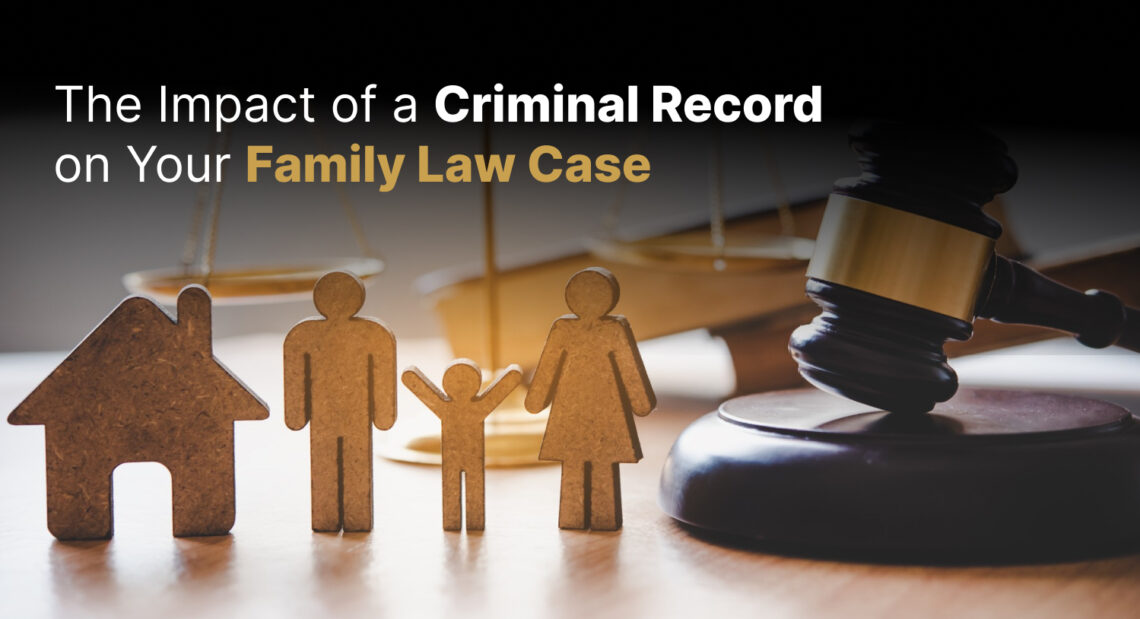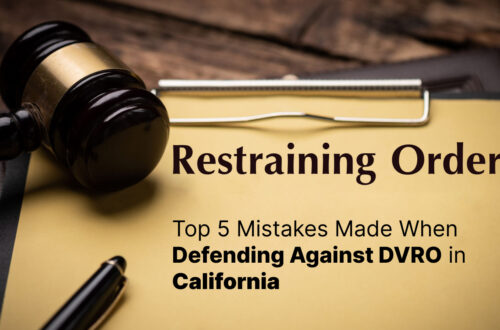A criminal record can have lasting effects on various aspects of a person’s life, influencing their reputation, future, and personal relationships. And if you are involved in a family law case, its impact can extend even further.
Courts often consider a person’s criminal history while making decisions about child support, custody, visitation, and other sensitive family matters. Judges may even scrutinize minor offenses or old convictions, which can influence their view of your character, responsibility, and ability to care for children.
Although the presence of a criminal record doesn’t directly determine the outcome of a family law case, it can still impact the court’s overall assessment of your situation.
How a Criminal Record Influences Family Law Decisions
A criminal record can raise a lot of questions; however, each case is unique, and the court carefully considers both the current situation and previous actions.
Here’s how a criminal record impacts decisions in family law cases:
Child Custody and Visitation
In California, the child’s best interests are always taken into consideration when making decisions about custody and visitation. If a parent’s criminal history suggests that a child’s safety or well-being could be at risk, the court may place restrictions or set conditions on custody and visitation.
Judges also look at signs of change, such as rehabilitation, responsible behavior, and how much time has passed since the offense.
Restraining Order
When a criminal record involves violence, harassment, or threats, it can strongly influence whether the court issues or extends a restraining order. In California, restraining orders are designed to protect individuals and children from potential harm, so a past offense may be taken as a sign of future risk.
Even if the record is old, patterns of repeated misconduct can weigh heavily in the decision. On the other hand, demonstrated progress and responsible conduct may lessen the impact.
Factors Courts Consider When Evaluating a Criminal Record
Criminal charges can raise concerns, but courts do not base their decisions solely on the record itself. Judges carefully examine several key factors to understand how the past may influence present responsibilities. The main factors include the following:
- Nature of the Offense: The seriousness of the offense matters a great deal. Violent crimes or offenses that suggest harm to others usually carry more weight than minor infractions. The more serious the behavior, the more likely it is to affect court decisions.
- Time Since the Offense: Courts also look at how long ago the offense happened. Older records may carry less influence, especially if the parent has demonstrated responsible behavior over time.
- Rehabilitation Efforts: Efforts to make positive changes are often taken into account. Participation in counseling, community service, education, or treatment programs shows a commitment to growth and responsibility.
- Impact on the Child: The well-being of the child is always the top priority. Judges consider whether a parent’s history poses any physical, emotional, or psychological risk.
- Pattern of Behavior: A single mistake is not viewed in the same way as repeated offenses. Courts take note of whether the record reflects an isolated event or an ongoing pattern.
How do Different Types of Crimes Affect Family Law Cases?
In family law cases, not all crimes carry the same weight. Courts consider the type of crime and its possible effect on the safety and well-being of children and family members. While every situation is unique, certain categories of crimes tend to influence custody, visitation, and parental rights more strongly than others.
- Violent Crimes: Offenses involving violence often have the most serious impact. Courts focus on protecting children from potential harm, so a history of violent behavior may limit custody rights or lead to supervised visitation.
- Drug and Alcohol-Related Offenses: Substance-related crimes raise concerns about judgment, stability, and the ability to provide a safe environment. In such cases, courts may require evidence of rehabilitation, such as treatment programs or ongoing sobriety, before allowing custody or unsupervised visitation.
- Sexual Offenses: Sex crimes usually result in very strict restrictions. A parent with this type of record may be denied custody and allowed only supervised visitation, if any. The priority is to protect children from possible risk.
- Crimes Involving Children: Any offense directly involving children is taken with the utmost seriousness. Such crimes often lead to the loss or severe restriction of parental rights, as the court’s primary duty is to protect the child’s safety and future.
- White-Collar or Non-Violent Crimes: Crimes such as fraud or financial misconduct may have less direct impact on custody or visitation. However, they can still affect family law cases if they threaten financial stability or the ability to meet a child’s needs.
Can Criminal Accusations Be Weaponized in Family Law Cases?
Yes, accusations of criminal behavior may be misused as a weapon to gain an upper hand. A parent might claim violence, abuse, or substance issues to influence custody decisions, restrict visitation, or damage the other parent’s credibility. These tactics can complicate the process, cause emotional distress, and even delay fair outcomes.
However, courts in California are mindful of this risk and carefully examine evidence before making decisions. Judges look beyond the accusations to determine whether there is credible proof or a pattern that supports the claims. False or exaggerated allegations are scrutinized because they can harm both parents and children. In such situations, having an experienced lawyer by your side is crucial. A skilled attorney can challenge weak or false claims, present strong evidence, and guide you through the legal process to protect your rights and reputation.
Conclusion
It is true that family law cases become more complex when a criminal record is involved, but it is not the sole basis for the judgment. Courts examine the overall circumstances, focusing on present conduct and the long-term well-being of the child. This means outcomes can vary greatly, and the way a case is prepared and argued can strongly influence the final decision.
High-stakes family matters require more than a basic understanding of the law. They call for strategic preparation, precise advocacy, and an ability to address sensitive issues with clarity.The Law Office of Parag Agrawal focuses on providing this level of representation, backed by over 12 years of courtroom experience in both criminal and family law. By combining deep legal knowledge with practical strategies, the firm works to protect parental rights and ensure that the welfare of children remains the top priority.
Disclaimer: The information provided in this blog is for general informational purposes only and is not intended as legal advice. It is recommended that you consult with a qualified criminal defense attorney to discuss your specific circumstances and receive personalized legal guidance. Parag Agrawal and Law Office of Parag Agrawal do not accept responsibility for any actions taken based on the information provided in this blog.






